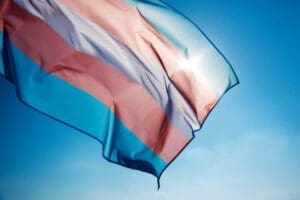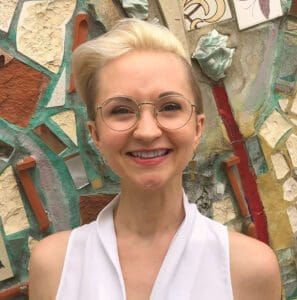Transgender Day of Visibility and Mental Health
Transgender Day of Visibility, or TDoV, is a day where we celebrate the lives and contributions of the transgender community. At a time of unprecedent discrimination and violence aimed at people who identify as transgender or nonbinary, it is more important than ever that we all come together to support those who are marginalized. Guest author and therapist CJ Mooney of PHIIRST shares their thoughts on Transgender Day of Visibility and mental health.

The transgender flag (pictured here) commonly used today was first proposed in 1999.
What does “visibility” really mean?
The notion of “transgender visibility” is as complex and nuanced as the expansive range of gender identities within the trans community. While being seen is vital to any kind of advocacy for change, standing out of the crowd as an openly trans or gender-expansive person can also mean vulnerability. For folx in this community, being publicly “out and proud” can be a mixed experience that opens us to attacks on our dignity, physical and emotional safety, and often our very lives. As we see clearly in the present political climate, violence also comes in the form of legislation; as of the writing of this post, the ACLU is tracking 430 anti-LGBTQ bills at the state level across the U.S., many of which seek to criminalize the bodies and identities of trans adults and children, and punish families and allies for validating their existence.
For those who do not enjoy the privilege of having their assigned gender be fully congruent with their gender identity and/or presentation, visibility can also trigger internalized negative experiences like shame, self-gaslighting, low self-worth, and a sense of disconnection from Self. Instances of anxiety, depression, self-harm, and suicide are highest in the trans-identified population, and this is most prevalent in transgender BIPOC and youth/adolescent demographics, folx who are systemically less culturally and economically empowered to safely access mental health and medical care. The Trevor Project’s 2022 national survey on LGBTQ+ youth mental health echoes these facts, adding that fears of being dismissed, misunderstood, or being non-consensually “outed” while trying to access care were some of the most significant
barriers.

Lucie Fielding (pictured here) is an author and therapist known, in part, for her 2021 book, Trans Sex: Clinical Approaches to Trans Sexualities and Erotic Embodiments
Allyship in action
All of this points to the fact that visibility is important, but is much more meaningful when accompanied by action. Trans-Week.com names the experiences of trans joy and empowerment as “the antidote to anti-trans violence”. In the mental health community, promoting trans joy and empowerment can come in many forms, but it is vital to begin with a clinician’s own honest reflection on the role gender has played in their lived experience. Cultural narratives and negative cognitive biases affect every individual in our society, but cisgender people are not often required or encouraged to critically explore these messages in the same way that gender-expansive folx have been forced to do.
Lucie Fielding, non-binary trans femme clinician and author of the award-winning book Trans Sex, suggests writing or other creative exercises that center the experience of “gender pleasure” (rather than “euphoria” or “dysphoria”), which can help in parsing out one’s true relationship to gender. By exploring times we have felt affirmed and embodied in our gender, we can also discover places that someone else’s story about our gender has felt inaccurate or oppressive; in this experience, cisgender and gender-expansive folks alike can find meaning and nuance in their relationship to this often under-explored but vital piece of identity.

Jennicet Gutiérrez (pictured here) is an activist for transgender rights and immigrant rights.
What can Transgender Day of Visibility inspire in you?
In the words of Jennicet Gutierréz, Co-Executive Director at Familia: Trans Queer Liberation Movement, “liberation is the ability for trans people to be able to create, to come to each other, enjoy each other’s beauty”. Activism and political engagement, educating yourself and others, writing or creating art, and strengthening community bonds are all ways to practice self-acceptance and celebrate the beautiful diversity of gender identities in our world. (These actions can be healing and promote better mental health in all genders!)
The resilience of the trans and gender-expansive community lies in our ability to hold two truths simultaneously – namely, that we are in a daily fight for our lives and basic human rights, and that we are capable of unapologetic joy, pleasure, embodiment, creativity, and celebration that exist outside the realm of conventional imagination.

CJ Mooney (picture here) is an eclectic systemic therapist at PHI
About the Author
CJ Mooney, MFT, CTP (they/she) is a queer, genderqueer, white, visibly able-bodied, neuro-atypical (AuDHD) sex/relationship & trauma therapist. They completed their internship work at CFR, and now work in private practice in Center City Philadelphia.
Follow them on Instagram.
More from CFR
Honoring Visibility During Disability History Month & Disability Employment Awareness Month
